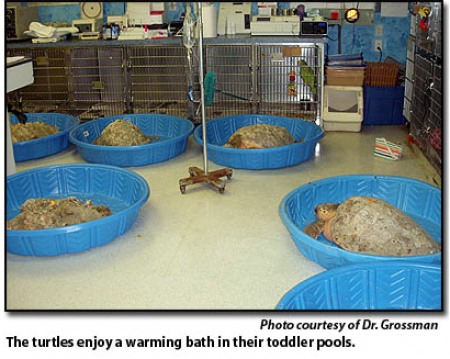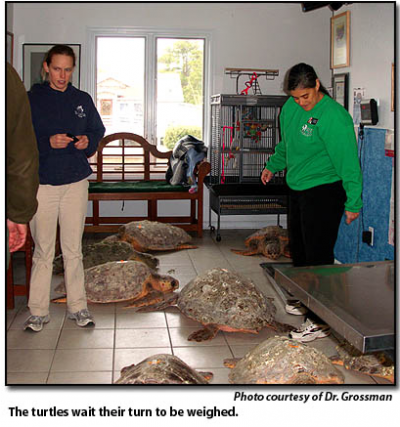Triage for Turtles
This article originally appeared on Island Free Press on February 10, 2010.

Except when they have turtles in them.
When 19 cold-stunned sea turtles were rescued recently on Ocracoke, they were loaded into trucks and taken to the emergency room at Roanoke Island Animal Clinic to see Drs. Mary Burkart and Mark Grossman.
“We do triage for the turtles,” said Grossman. “We check to see if they have pneumonia, if they’re hypoglycemic, take x-rays if they appear to be injured. We can give them antibiotics for infection, or sugar if they need it. But mostly we just warm them up.”
The trick is to slowly raise the turtle’s body temperature by warming the water it’s in. First cool water, then tepid, then lukewarm. The vets keep the turtles stable until the North Carolina Aquarium staff can come pick them up for long-term rehab. The turtles are then released back into the Gulf Stream.
On Saturday, February 6th, Burkart and Grossman treated the 19 turtles from Ocracoke, plus nine more. They saw loggerheads, Kemp’s ridleys, and green sea turtles.
“We’d never had that many big sea turtles at once,” Grossman said. “We had them in tubs on the floor, and we kept some of the big 150-pound turtles in dog runs, with soaked towels over them. We did the best we could that night, and it was cool because a lot of people really came together to help. Volunteers from NEST [Network for Endangered Sea Turtles], and the Marine Mammal Strandings volunteers helped move turtles for three or four hours.” 
The ones nearby will continue to be treated by Burkart – she’s the staff veterinarian for the aquarium. Grossman is the official vet for the state’s “Return to The Wild” Red Wolf Program.
The husband-and-wife team developed an interest in local wildlife soon after they opened their Roanoke Island practice in 1992. During their first Thanksgiving dinner on the island, they got a page about a big loggerhead turtle in Kitty Hawk. Another Outer Banks vet had just refused to treat the animal, saying it was illegal to treat an endangered species.
Dr. Grossman did not agree.
“I said to Mary, ‘That can’t be right. We’re licensed vets. We can treat any animal.’ So I told them ‘Bring it on down to the clinic!’” said Grossman.
He admits that he wasn’t too sure about the loggerhead.
“I had no idea what to do,” he said. “I’d treated box turtles before, but…”
On a wall at the clinic hangs a picture of Grossman and Burkart’s young son standing next to that first sea turtle in the bathtub. The caption reads: “C’mon, Dad, let’s take him home. Mom won’t care!”
It was on that night that the doctors began learning about the condition called “cold-stunning” that affects sea turtles when the water temperatures drop suddenly. And it was also when they made a life-changing decision about their clinic.
“Mary and I decided that day that we would open our doors to wildlife, and we’d treat any animal that came in, free of charge. Since then we’ve treated bald eagles, owls, otters, deer, dolphins, the list goes on and on,” he said.
Burkart and Grossman treat wildlife for free. In the case of the sea turtles, their time and clinic space is donated. If the turtles need blood work, the non-profit NEST picks up that tab. Because of the vets’ dedication to wildlife, all live, stranded, cold-stunned turtles on the Outer Banks end up at Roanoke Island Animal Clinic for a splash in the toddler pools.
(RIAC accepts donations to help off-set the costs of providing wildlife care. To see other wild creatures they’ve treated, please visit the “wildlife” page at www.roanokeislandanimalclinic.com.)



